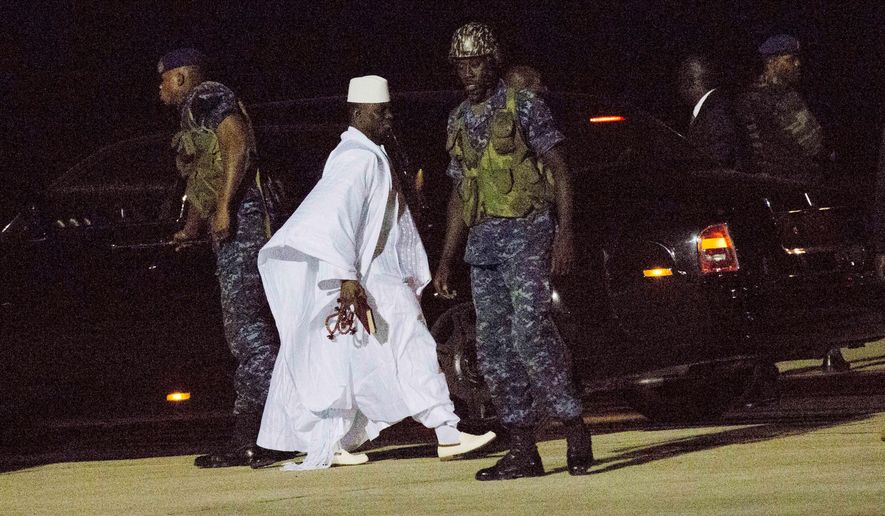BANJUL, Gambia (AP) - Gambia’s capital on Sunday was awaiting the arrival of the country’s new leader and an era of democracy, hours after the authoritarian ruler of 22 years flew into exile with an extraordinary set of assurances from the international community.
Even as new President Adama Barrow remained in neighboring Senegal awaiting a triumphant return after a whirlwind political crisis sparked by his December election win, former leader Yahya Jammeh was guaranteed the right to come home.
A joint declaration issued shortly after Jammeh left by the United Nations, African Union and West African regional bloc said the bodies will work with Barrow’s government to make sure Jammeh, his family and his close associates are not the target of punishment.
The unpredictable Jammeh, known for startling declarations like his claim that bananas and herbal rubs could cure AIDS, flew off late Saturday with a wave as supporters and soldiers wept. He was last seen flying toward Equatorial Guinea. The country is not a state party to the International Criminal Court.
Jammeh’s dramatic about-face on his election loss to Barrow, at first conceding and then challenging the vote, appeared to be the final straw for the international community, which had been alarmed by his moves in recent years to declare an Islamic republic, leave the Commonwealth and leave the ICC.
With global backing, Barrow was sworn in Thursday at Gambia’s embassy in Senegal for his safety, hours after Jammeh’s mandate expired at midnight. Meanwhile, Jammeh was abandoned by his defense chief and many Cabinet members.
A regional military force that had been poised to oust Jammeh if last-minute diplomatic efforts failed entered Gambia shortly after his departure and was securing the country and its capital, Banjul, ahead of Barrow’s arrival.
“President Barrow would like to leave (Senegal) as soon as possible. One can’t leave the country open,” Marcel Alain de Souza, chairman of the regional bloc, told reporters. But part of Gambia’s security forces needed to be “immobilized,” he said, and he confirmed that Jammeh had had mercenaries by his side during the standoff.
De Souza also revealed details of the negotiations before Jammeh’s departure. In response to his insistence on “a sort of amnesty” for him and his entourage, the West African regional body attempted to have Gambia’s national assembly vote on an amnesty law. “Sadly, we couldn’t reach a quorum. The deputies had fled,” de Souza said. “Most were in their villages. The others were in Dakar,” Senegal’s capital.
Jammeh also wanted to stay in his home village in Gambia, but regional heads of state preferred that “for the moment” he leave the country, de Souza said.
With Jammeh gone, a country that had waited in silence during the standoff sprang back to life. Shops and restaurants opened, music played and people danced in the streets.
As he waited for the arrival of the regional force in Banjul, Gambia defense chief Ousmane Badjie said the military welcomed it “wholeheartedly.” With proper orders, he said, he would open the doors to the notorious prisons where rights groups say many who have disappeared over the years may be kept.
“We are going to show Barrow we are really armed forces with a difference, I swear to God,” Badjie said. “I have the Quran with me.”
Some of the 45,000 people who had fled the tiny country during the crisis began to return. The nation of 1.9 million, which promotes itself to overseas tourists as “the Smiling Coast of Africa,” has been a major source of migrants heading north toward Europe because of the situation at home.
Barrow, who has promised to reverse many of Jammeh’s actions, told The Associated Press on Saturday that at he will launch a truth and reconciliation commission to investigate the alleged human rights abuses of Jammeh’s regime.
“After 22 years of fear, Gambians now have a unique opportunity to become a model for human rights in West Africa, in which no one need to be afraid to stand up or speak out,” Amnesty International’s deputy director for West and Central Africa, Steve Cockburn, said in a statement Sunday.
___
Associated Press writers Krista Larson and Babacar Dione in Dakar, Senegal contributed.




Please read our comment policy before commenting.